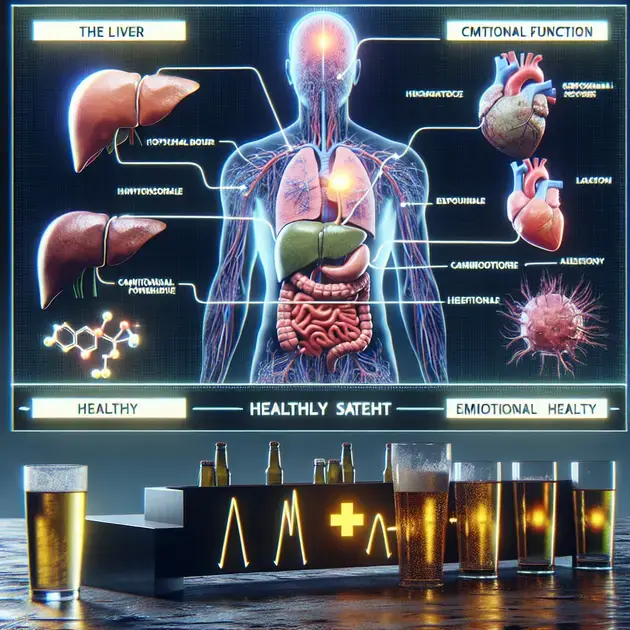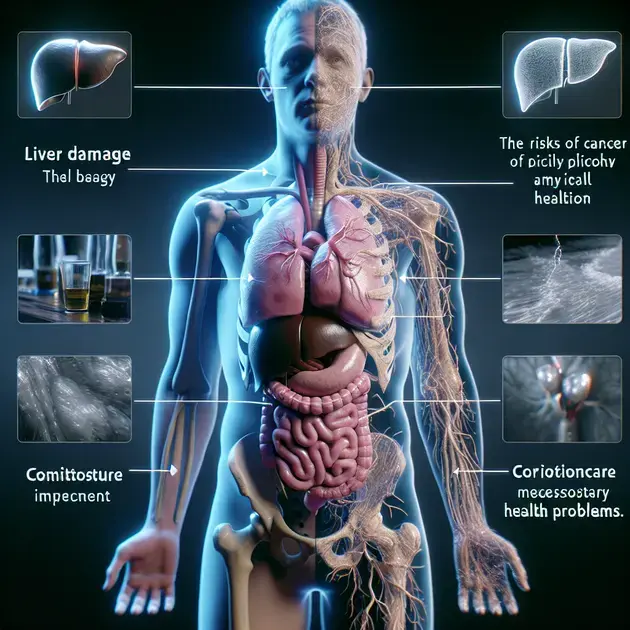Understanding the effects of alcohol on your body is crucial for making informed decisions about your health and well-being. With alcohol being one of the most widely consumed substances worldwide, it’s important to be aware of how it can impact your physical and mental health.
From impaired motor skills to liver damage, alcohol can have a wide range of effects on the body. Recent studies have also shown a link between excessive alcohol consumption and an increased risk of certain types of cancer, highlighting the importance of understanding the potential consequences of drinking alcohol.
The Physical Impact of Alcohol Consumption
Alcohol consumption can have various physical impacts on the body. From short-term effects such as impaired judgment and coordination to long-term consequences like liver disease and heart damage, understanding these impacts is crucial.
One way to track your alcohol consumption and its effects on your body is by using the app “DrinkControl.” This app allows you to log your drinks and monitor your alcohol intake over time. By inputting the type and quantity of alcohol you consume, the app can provide insights into how it may be affecting your health.
Monitoring your alcohol consumption can help you make informed decisions about your drinking habits and take steps to reduce any negative physical impacts. Additionally, seeking professional help or counseling can provide further support in managing alcohol-related health issues.
By being aware of the physical impact of alcohol consumption and actively monitoring your intake, you can take control of your health and well-being.
Understanding the Connection Between Alcohol and Liver Health
Step-by-Step Guide:
- Start by researching credible sources such as the National Institute on Alcohol Abuse and Alcoholism (NIAAA) website.
- Learn about how alcohol affects the liver and the potential risks of liver disease associated with excessive drinking.
- Use online tools like the “Liver Health Tracker” app to monitor your liver health markers and understand the impact of alcohol on this vital organ.
- Consult with a healthcare professional or a liver specialist to discuss your alcohol consumption and any concerns about liver health.
- Create a plan to reduce or quit alcohol consumption, incorporating healthy lifestyle choices to support liver function.
Understanding the connection between alcohol and liver health is essential for maintaining a healthy liver and preventing serious conditions related to alcohol abuse. By taking proactive steps to protect your liver, you can improve your overall well-being.
Exploring the Link Between Alcohol and Cancer Risk
Research has shown a clear link between alcohol consumption and an increased risk of developing various types of cancer, including liver, breast, and colorectal cancer. The more alcohol a person drinks regularly, the higher their risk of cancer becomes.
To explore this connection further, visit reputable sources like the American Cancer Society website, which provides detailed information on the relationship between alcohol and cancer risk. Understanding the specific mechanisms by which alcohol can contribute to cancer formation can motivate individuals to make healthier choices regarding their drinking habits.
Apps like “Cancer Research UK’s Alcohol Tracker” can help individuals track their alcohol intake, set limits, and receive personalized recommendations to reduce their cancer risk. By utilizing these resources, individuals can make informed decisions and take steps to minimize their alcohol-related cancer risk.
By exploring the link between alcohol consumption and cancer risk, individuals can make proactive choices to protect their health and reduce the likelihood of developing alcohol-related cancers in the future.
**
The Cognitive Effects of Alcohol Consumption
**
When it comes to the cognitive effects of alcohol consumption, it is important to understand the impact it can have on our brain functions. Excessive drinking can impair cognitive abilities such as memory, decision-making, and problem-solving skills. Studies have shown that chronic alcohol abuse can lead to cognitive deficits and even contribute to the development of conditions like dementia.
Research has also indicated that moderate alcohol consumption may have some benefits for cognitive health, such as a reduced risk of cognitive decline in older adults. However, it is crucial to note that these potential benefits are outweighed by the negative effects of excessive drinking. It is recommended to consume alcohol in moderation and be aware of the potential consequences on cognitive function.
Furthermore, the quality of alcohol consumed can also play a role in its cognitive effects. Opting for high-quality alcoholic beverages, such as the world’s most expensive wines, may lower the risk of negative cognitive impact compared to cheaper, lower-quality options. It is essential to be mindful of the type and amount of alcohol consumed to protect cognitive health in the long run.
In conclusion, the cognitive effects of alcohol consumption can vary depending on the level of intake and the quality of the alcoholic beverages. While moderate alcohol consumption may have some potential benefits for cognitive health, excessive drinking can lead to cognitive impairments and long-term consequences. Choosing high-quality alcohol options, like the most expensive wines, can potentially mitigate the negative impact on cognitive function.
**
The Emotional Impact of Excessive Drinking
**
Excessive drinking can have a profound emotional impact on individuals, affecting their mental well-being and overall quality of life. Alcohol abuse is often linked to mood disorders such as depression and anxiety, as well as increased risk of impulsive behavior and aggression. These emotional consequences can further exacerbate existing mental health issues and create a cycle of negative emotional experiences.
Individuals who engage in excessive drinking may use alcohol as a coping mechanism to deal with stress, trauma, or other underlying emotional issues. However, relying on alcohol to regulate emotions can lead to dependency and worsen emotional stability over time. Seeking healthier coping strategies and professional support is essential to address the emotional impact of excessive drinking.
Moreover, the social consequences of excessive drinking can also contribute to emotional distress. Relationships may suffer, and individuals may experience feelings of guilt, shame, and isolation due to their drinking habits. Over time, these emotional stressors can further perpetuate a cycle of alcohol abuse and emotional instability.
It is crucial for individuals struggling with excessive drinking to seek help and address the emotional impact of their behavior. Through therapy, support groups, and lifestyle changes, individuals can work towards improving their emotional well-being and breaking free from the detrimental effects of alcohol abuse.
**
Alcohol’s Influence on Cardiovascular Health
**
Understanding alcohol’s influence on cardiovascular health is essential for maintaining a healthy heart and reducing the risk of heart-related diseases. While some studies suggest that moderate alcohol consumption, particularly red wine, may have cardiovascular benefits due to its antioxidant properties, excessive drinking can have detrimental effects on the heart.
Chronic heavy drinking is associated with an increased risk of hypertension, irregular heartbeats, and weakened heart muscles. These cardiovascular issues can eventually lead to more severe conditions like heart disease and stroke if left untreated. It is important to recognize the fine line between moderate and excessive alcohol consumption when considering its impact on cardiovascular health.
Choosing high-quality alcoholic beverages, such as premium wines with known health benefits, can potentially offer some protective effects for the heart. However, it is crucial to consume alcohol in moderation and be mindful of individual health conditions and risk factors that may interact with alcohol consumption.
Regularly monitoring cardiovascular health through check-ups and consultations with healthcare professionals is key to understanding how alcohol may impact individual heart health. By staying informed and making informed choices about alcohol consumption, individuals can better protect their cardiovascular well-being and overall health in the long term.
**
Conclusion
**
Alcohol consumption, whether moderate or excessive, has significant effects on cognitive function, emotional well-being, and cardiovascular health. Understanding the cognitive impact of alcohol is crucial, as excessive drinking can lead to impairments in memory, decision-making, and problem-solving skills, potentially contributing to conditions like dementia. While moderate consumption may offer some benefits, the negative effects of excessive drinking outweigh them, emphasizing the importance of moderation to safeguard cognitive health.
Excessive drinking also takes a toll on individuals emotionally, linking to mood disorders, impulsive behavior, and strained relationships. Using alcohol as a coping mechanism can lead to dependency and worsen emotional stability. Seeking professional help and healthier coping strategies are key to addressing the emotional consequences of excessive drinking and breaking free from the cycle of negative emotional experiences.
When it comes to cardiovascular health, understanding the impact of alcohol is crucial for preventing heart-related diseases. While moderate consumption, especially of red wine, may have some benefits, chronic heavy drinking poses risks like hypertension and heart muscle weakening. Opting for high-quality alcoholic beverages and monitoring heart health regularly can aid in protecting the heart and overall cardiovascular well-being in the long term, underscoring the importance of informed choices regarding alcohol consumption.

